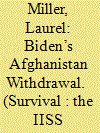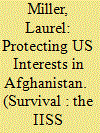| Srl | Item |
| 1 |
ID:
180381


|
|
|
|
|
| Summary/Abstract |
Deciding to end the US military presence in Afghanistan is tantamount to admitting that, for the US, defeat is a tolerable outcome.
|
|
|
|
|
|
|
|
|
|
|
|
|
|
|
|
| 2 |
ID:
116656


|
|
|
|
|
| Publication |
2013.
|
| Summary/Abstract |
Societies emerging from conflict face many obstacles to achieving enduring peace, economic development and political reform. These include sectarian divides, historical animosities, poverty, weak institutions and malign neighbours. Some analysts have found these local factors so various as to argue that there can be no generic approaches to post-conflict stabilisation and reconstruction (known more colloquially as nation-building). Others have argued that these obstacles are so daunting as to make the whole nation-building project too difficult and expensive to even attempt. Yet of 20 major peacekeeping or peace-enforcement interventions undertaken since the end of the Cold War, 16 have produced greater peace, 18 saw increases in democratisation (according to Freedom House), 17 saw improvements in government effectiveness (according to the World Bank), 18 experienced economic growth - indeed, generally faster growth than other countries in their region - and 18 saw improvements in their human development, as measured by the UN.
|
|
|
|
|
|
|
|
|
|
|
|
|
|
|
|
| 3 |
ID:
183784


|
|
|
|
|
| Summary/Abstract |
It is unrealistic to expect the Taliban regime to provide Afghanistan with a representative government that respects human rights in line with American preferences, or to constitute a strong security partner for the United States. But Washington still has choices about the relationship it can have with Kabul. The US government should move beyond its post-withdrawal hybrid policy of isolation and limited engagement – essentially, no relationship beyond occasional ad hoc problem-solving – to one that is better able to protect US interests in the region. These include preventing Afghanistan from becoming a base for transnational terrorist groups, securing the departure of Afghans at risk due to their association with the US occupation, and tamping down anti-Western sentiment. A bilateral relationship that establishes routine US diplomatic engagement, a development-assistance programme and tailored sanctions is required.
|
|
|
|
|
|
|
|
|
|
|
|
|
|
|
|